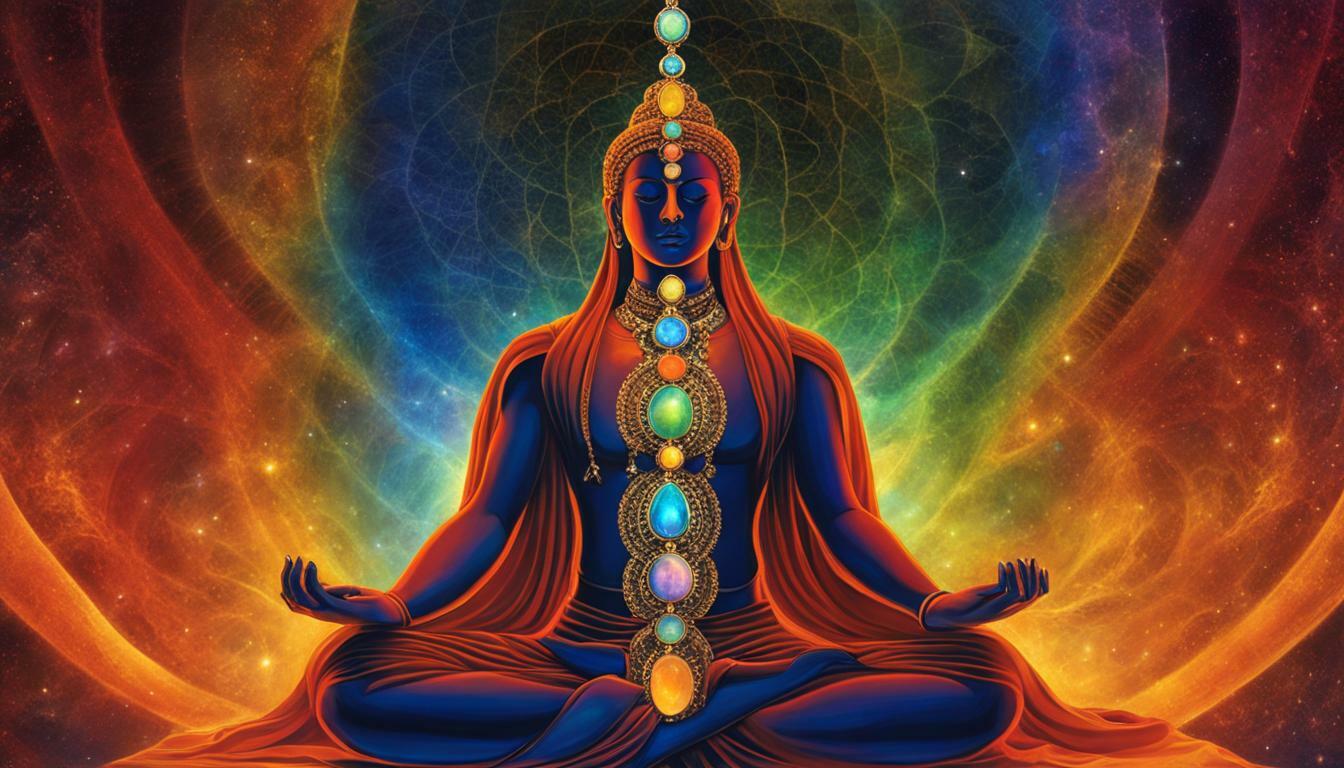Vipassana meditation is an ancient technique dating back over 2500 years, rediscovered by Gotama Buddha. It is a self-transformation practice that focuses on the connection between the mind and body. By observing physical sensations and understanding their nature, practitioners dissolve mental impurities and cultivate a balanced mind filled with love and compassion. This technique, based on scientific laws, brings increased awareness, self-control, and peace to one’s life.
Key Takeaways:
- Vipassana meditation is an ancient technique that aims to see things as they really are.
- It focuses on the connection between the mind and body.
- By observing physical sensations, practitioners dissolve mental impurities and cultivate a balanced mind.
- Vipassana meditation brings increased awareness, self-control, and peace.
- It is based on scientific laws and has numerous benefits for mental wellness.
The Tradition of Vipassana Meditation
Vipassana meditation has a rich tradition that has been passed down through generations since the time of Buddha. The current teachers in this lineage were appointed by S.N. Goenka, an esteemed Indian teacher who learned Vipassana from Sayagyi U Ba Khin in Burma. Goenka began teaching Vipassana in 1969 and has trained numerous assistant teachers to meet the growing demand for courses.
The tradition of Vipassana emphasizes the preservation of the technique in its original form and is taught freely without any commercial motives. The expenses of the courses are covered by donations from individuals who have benefited from Vipassana. This ensures that the practice remains accessible to all, regardless of their financial background.
Under the guidance of S.N. Goenka and his team of assistant teachers, Vipassana continues to spread worldwide, touching the lives of countless individuals seeking inner peace and self-transformation.
“The true essence of Vipassana can be experienced only through direct practice. No one can give it to you or teach it to you. You have to experience it yourself.” – S.N. Goenka
The Vipassana Courses
Vipassana courses offer a transformative experience through the practice of the Vipassana technique. These ten-day residential programs provide an opportunity to learn and immerse oneself in the meditation practice. The courses require a serious commitment, as participants must adhere to a Code of Discipline that encompasses ethical guidelines. This includes abstaining from killing, stealing, sexual activity, speaking falsely, and the use of intoxicants.
The training consists of three steps that progressively lead to a deep understanding of the mind-body connection. Firstly, participants learn to calm the mind through moral conduct, creating a foundation for the practice. Then, they develop mastery over the mind by focusing on the breath, cultivating concentration and mindfulness. Finally, the practice of Vipassana begins, where individuals observe physical sensations throughout the body, gaining insight into the nature of reality.
It is important to note that Vipassana courses are offered freely, with all expenses covered by donations from individuals who have benefited from the practice. Participants are welcome to donate if they wish to support the continuation and accessibility of these courses. The generosity of previous attendees allows these transformative experiences to remain accessible to all sincere individuals seeking mental wellness and personal growth.
| Key Features of Vipassana Courses | Benefits |
|---|---|
| Intensive ten-day residential programs | Enhanced self-awareness |
| Code of Discipline to guide participants | Improved concentration and focus |
| Three-step training process | Release of mental impurities |
| Emphasis on observing physical sensations | Cultivation of love and compassion |
| Freely offered with donations to support expenses | Development of self-control and peace |
Vipassana Centers and Course Locations
If you’re interested in experiencing the transformative effects of Vipassana meditation, you’ll find numerous course locations available worldwide. Vipassana courses are conducted both at dedicated Vipassana Centers and at Non-Center locations. These venues offer immersive residential programs where you can learn and practice the Vipassana technique.
Vipassana Centers, located in different regions across the globe, provide a serene environment conducive to meditation and self-reflection. Whether you’re in India, Asia/Pacific, North America, Latin America, Europe, Australia/New Zealand, the Middle East, or Africa, you can find a Vipassana Center near you. These Centers follow the teachings of S.N. Goenka and offer courses taught by trained assistant teachers.
In addition to the dedicated Centers, there are also Non-Center locations where Vipassana courses are conducted. These courses are organized by local Vipassana students and held at rented sites in various cities and communities. Non-Center courses provide an opportunity for individuals who may not have easy access to a Vipassana Center to learn and practice the meditation technique.
Vipassana Course Locations Worldwide
| Region | Location |
|---|---|
| India | Delhi |
| Asia/Pacific | Singapore |
| North America | New York |
| Latin America | Mexico City |
| Europe | Paris |
| Australia/New Zealand | Sydney |
| Middle East | Dubai |
| Africa | Cape Town |
To find a complete list of course locations worldwide, you can visit the official Vipassana website. The website provides a user-friendly graphical interface that allows you to search for courses based on your location or preferred dates. Whether you’re a beginner or an experienced practitioner, Vipassana meditation offers you the opportunity to embark on a journey of self-discovery and inner transformation at a location convenient for you.
Vipassana Meditation Techniques
Vipassana meditation, also known as insight meditation, offers a variety of techniques to deepen your practice and enhance your understanding of the true nature of existence. These techniques are designed to sharpen your focus, cultivate awareness, and bring about inner transformation. In this section, we will explore some of the key Vipassana meditation techniques and provide step-by-step instructions for incorporating them into your daily practice.
1. Mahasi Sayadaw Method
The Mahasi Sayadaw method is a popular Vipassana technique developed in Burma. It involves precise awareness of the rising and falling of the abdomen as the primary object of meditation. To practice this technique, find a quiet place to sit comfortably and close your eyes. Direct your attention to the sensation of your breath as it moves in and out of your body. As you breathe in, mentally note “rising,” and as you breathe out, note “falling.” Maintain this focused awareness, noting any thoughts, emotions, or physical sensations that arise, and gently returning your attention to the rising and falling of the abdomen.
2. Noting Technique
The noting technique is another powerful Vipassana practice that involves observing and noting all mental and physical phenomena that arise in your experience. Begin by sitting in a comfortable position and bringing your attention to the sensation of your breath. As thoughts, emotions, or sensations arise, silently note them with a word or phrase that describes their nature. For example, if you feel tension in your body, note “tightness.” If a thought arises, note “thinking.” Maintain this steady observation and noting of your experience, allowing everything to arise and pass away without clinging or aversion.
3. Walking Meditation
Walking meditation is a complementary practice to sitting meditation that can help cultivate balance, accuracy, and continuity of awareness. Find a quiet, open space where you can walk back and forth comfortably. Begin by standing still and bringing your attention to the sensation of your feet touching the ground. Slowly start to walk, paying close attention to the movement of your feet, the shifting of your weight, and the sensations in your body. If your mind wanders, gently bring it back to the present moment and the physical experience of walking. Engage in this mindful walking practice for a period of time, allowing yourself to fully experience each step.
| Technique | Description |
|---|---|
| Mahasi Sayadaw Method | Precise awareness of the rising and falling of the abdomen |
| Noting Technique | Observing and noting all mental and physical phenomena |
| Walking Meditation | Cultivating awareness through mindful walking |
These are just a few examples of the Vipassana meditation techniques you can incorporate into your practice. Each technique offers a unique approach to developing mindfulness and insight into the nature of reality. Experiment with different techniques and find what resonates with you. Remember, the key to successful Vipassana practice is regularity and patience. With dedicated effort and an open mind, you can deepen your understanding of yourself and the world around you through the transformative power of Vipassana meditation.
Conclusion
Vipassana meditation offers a wide range of benefits for your mental wellness and daily life. By practicing Vipassana, you can experience increased awareness, non-delusion, self-control, and peace. This ancient technique helps dissolve mental impurities and cultivates a balanced mind filled with love and compassion. Through continued practice, you have the opportunity to attain liberation and real happiness.
Vipassana courses, taught in the tradition of S.N. Goenka, are available worldwide and offered freely. Whether you are a beginner or an experienced meditator, all sincere individuals are welcome to join a course and experience the transformative effects of Vipassana meditation. It is a powerful tool that can bring about positive changes in your life.
So, if you are in search of mental wellness and a deeper understanding of yourself, consider incorporating Vipassana meditation into your daily practice. Take the first step towards a more balanced and peaceful mind. Start your journey of self-transformation today and unlock the benefits of Vipassana meditation.
Can Vipassana Meditation Be a Type of Meditation Experience?
Vipassana meditation can definitely be a type of meditation experience that provides numerous benefits. By focusing on the present moment and observing sensations in the body, one can experience the calming and insightful effects of Vipassana meditation. Try it out to experience meditation benefits now.
FAQ
What is Vipassana meditation?
Vipassana meditation is an ancient technique of meditation that focuses on seeing things as they really are. It aims to eradicate mental impurities and achieve liberation.
How old is Vipassana meditation?
Vipassana is an ancient technique that dates back over 2500 years. It was rediscovered by Gotama Buddha and has been passed down through an unbroken chain of teachers since then.
Who teaches Vipassana meditation?
The current teachers in the Vipassana tradition were appointed by S.N. Goenka, an Indian teacher who learned Vipassana from Sayagyi U Ba Khin. Goenka began teaching Vipassana in 1969 and trained many assistant teachers.
How are Vipassana courses funded?
Vipassana courses are taught freely without any commercial motives. The expenses of the courses are covered by donations from those who have benefited from Vipassana.
What is the Code of Discipline for Vipassana courses?
The Code of Discipline for Vipassana courses includes abstaining from killing, stealing, sexual activity, speaking falsely, and intoxicants.
What are the steps in Vipassana meditation training?
The training consists of calming the mind through moral conduct, developing mastery over the mind by focusing on the breath, and practicing Vipassana by observing sensations throughout the body.
Where are Vipassana courses held?
Vipassana courses are held in numerous Meditation Centers and Non-Center locations worldwide. The locations include India, Asia/Pacific, North America, Latin America, Europe, Australia/New Zealand, the Middle East, and Africa.
How can I apply for a Vipassana course?
Participants can apply for Vipassana courses online. The comprehensive list of worldwide course locations is available, along with a graphical interface for easier navigation.
What are the benefits of Vipassana meditation?
By practicing Vipassana, individuals can experience increased awareness, non-delusion, self-control, and peace. The technique helps dissolve mental impurities and cultivates a balanced mind filled with love and compassion.
Are Vipassana courses free?
Yes, Vipassana courses are taught freely, and participants can donate to support the expenses if they wish.








